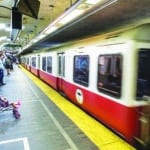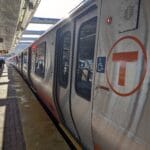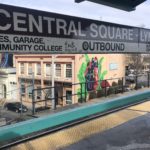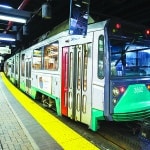
by State House News Service | Apr 20, 2023
Officials will end service early on several nights in the next month to accelerate necessary repairs, but transit advocates called the plan “untennable” in light of upcoming Sumner Tunnel closures.

by State House News Service | Jul 20, 2022
The reduced subway frequencies and crowding that business leaders say is helping keep workers away from downtown offices might not go away until next year, one MBTA overseers fears.

by James Sanna | Jun 17, 2022
The MBTA plans to slash subway service dramatically starting June 20 until it can hire enough dispatchers to resume normal service in line with Federal Transit Agency safety directives.

by State House News Service | May 17, 2022
Four days after the T announced it would again extend the shutdown of Blue Line subway service between Maverick and Bowdoin because a “construction tool cart derailed,” MBTA General Manager Steve Poftak told reporters there have in fact been three such incidents during the maintenance effort.

by State House News Service | May 10, 2022
A 14-day shutdown of a segment of the Blue Line designed to accelerate repairs will now become a 19-day shutdown, in the process indefinitely postponing a second project eyed for later this week.

by State House News Service | Apr 12, 2022
Four Blue Line stops in East Boston and Revere will go offline to riders for two and a half weeks in May, adding to a previously delayed 14-day shutdown on the line’s other end designed to accelerate repair work, officials announced Monday.

by State House News Service | May 15, 2020
Two MBTA maintenance projects will launch Monday that will shut down train service on the affected lines for at least a week, an effort by the T to accelerate original plans and take advantage of lower ridership during the COVID-19 pandemic.

by State House News Service | Sep 24, 2019
The city delegation has long pushed for better connectivity between Boston and the North Shore, lamenting the congested highways and tunnels many residents endure to get to work.
by Peter Paul Payack | Sep 22, 2019
There will be so many studies done on the Red-Blue Connector it’s going to be a paper train, literally.

by Banker & Tradesman | Aug 20, 2019
A 305-unit apartment complex across from Revere Beach has opened a marketing center and beguin preleasing preleasing in preparation for October move-ins.

by State House News Service | Jul 23, 2019
The MBTA is struggling to deliver satisfactory service within its core area, but lawmakers are poised to ask the transit authority to study more expansion.

by State House News Service | Jul 18, 2019
Boston Mayor Marty Walsh called Wednesday for the MBTA to invest about $9 million in running Red Line and commuter rail trains more frequently, slamming the system – wracked with ongoing delays after a derailment last month – as “not currently a functional service” for much of the city.
by Banker & Tradesman | Jun 2, 2019
Instead of treating the project as pipe dream expansion of the current system, MassDOT needs help from the business community to see the Red-Blue Connector for what it is: a relatively cheap way to reduce congestion from Kendall Square to Logan Airport, and boost the North Shore’s economic prospects at the same time.

by Banker & Tradesman | Mar 25, 2019
Separate developments proposed by Rock Development and Transom Real Estate would see nearly 200 units rise on two parcels facing Logan Airport in East Boston.
by Peter Paul Payack | Mar 10, 2019
Attention passengers. Please be advised the MBTA is planning a 6.3 percent increase in the quality of its service.

by Banker & Tradesman | Feb 12, 2019
Emergency repairs are ongoing, and the MBTA is speeding up a study of the system’s power infrastructure and a $170 million contract to upgrade its power systems.

by State House News Service | Feb 5, 2019
Transportation Secretary Stephanie Pollack announced Monday the agency’s long-term plan for projects to be completed by 2040 would include a subway extension connecting the lines, not a walking path.

by State House News Service | Nov 27, 2018
The rising cost of MBTA pensions has board members concerned about the long-term stability of the retirement program for an agency where ridership over the first three months of the budget year dipped nearly 2 percent.















